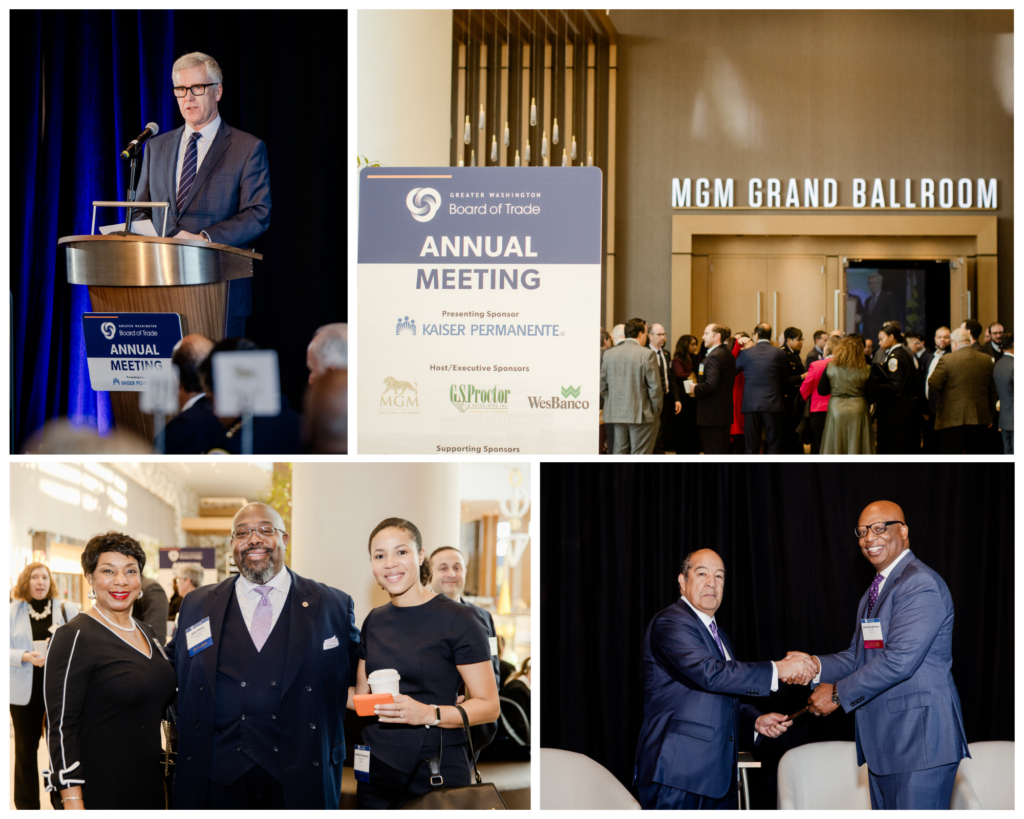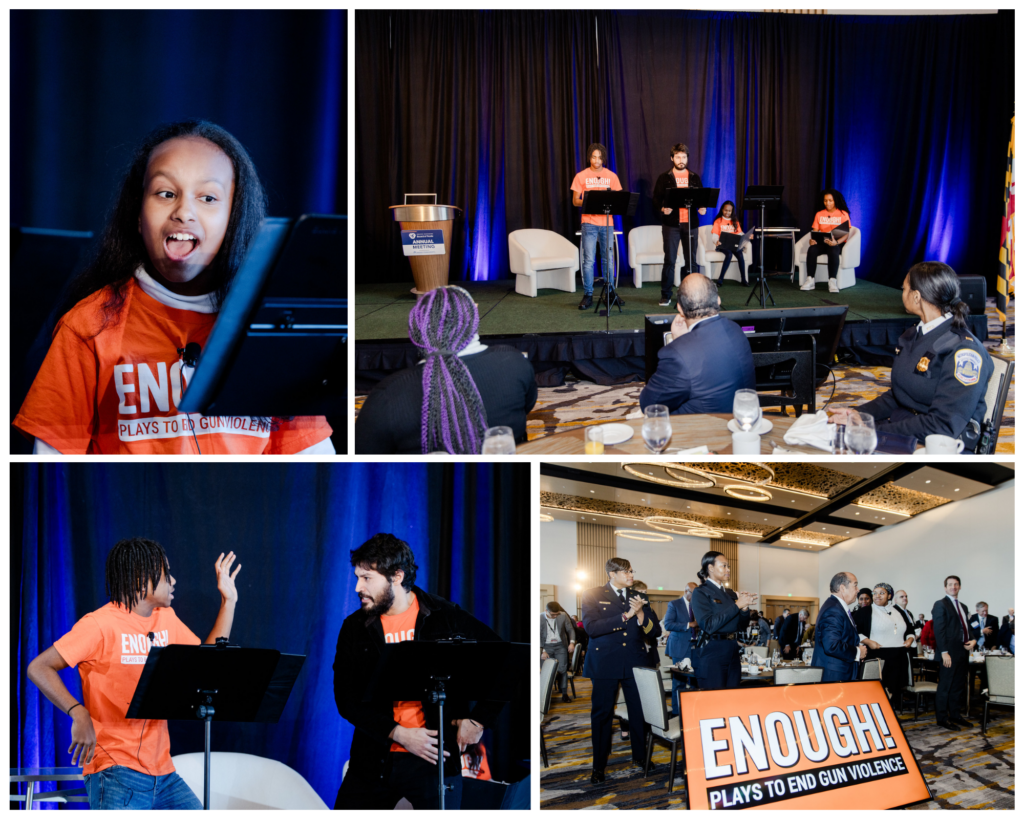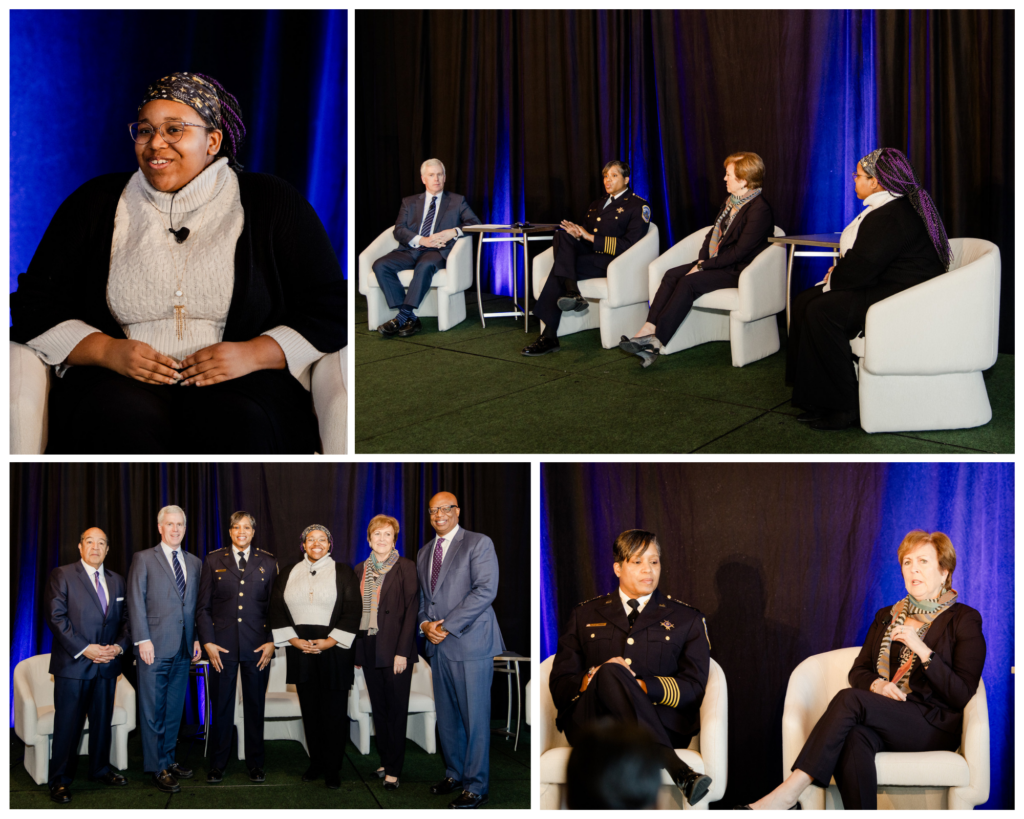GWBOT’s 2023 Annual Meeting highlights Growth, Arts Advocacy, and Community Collaboration around Public Safety
The Board of Trade’s 2023 Annual Meeting, presented by Kaiser Permanente, was held on Dec. 12 at the MGM National Harbor Resort in Oxon Hill, Maryland, and recapped a year of growth for the Board of Trade. The meeting brought together nearly 300 members of GWBOT to celebrate recent accomplishments, look at the year ahead for the organization, and discuss the importance of the arts to the Greater Washington community, specifically in the context of violent crime, as it has become such a prominent area of concern in the region.
From the Stage:
Board of Trade President & CEO Jack McDougle, outgoing Board Chair Jermaine Johnson, and incoming Board Chair Steve Proctor started with discussions of what the Board of Trade has accomplished over the past year and where they see the organization moving over the next. This included sharing a 90-percent member retention rate for 2023, the growth of our policy and advocacy department to push forth and make an impact on our members’ positions in the region, how we will work with our partners to address the critical $750 Million funding gap for WMATA/METRO, and how we will continue to address growing public safety issues for regional businesses. The annual meeting also allowed a vote to confirm the upcoming GWBOT Board of Directors and introduce new 2024 Board Officers as part of the excitement for our organization heading into the new year and how we can enhance our impact, grow membership, and maximize member engagement.

Click here to view more pictures from Annual Meeting
We also had the pleasure of hearing from Ruth Williams-Brinkley, President at Kaiser Permanente Mid Atlantic States, on the great work Kaiser is doing to build healthy communities in our region before handing the discussion off to Deborah Rutter, President of The John F. Kennedy Center for the Performing Arts, who introduced the primary topic of conversation around the vital importance of the arts to the region, remarking on the enormous value of arts and culture for the region’s businesses, as well as the role that access to the arts plays in the mental and general wellbeing of the rest of the region’s communities.
In discussing what the region might look like without museums, arenas, theaters, and gathering spaces that shape the civic lives of residents, Deborah discussed a recent National Endowment for the Arts and Americans for the Arts poll in which 86% of respondents say that the arts vastly improve their lives in their communities and that arts in the non-profit sector make up a $13.8 Billion chunk of the DC economy and around $50 Billion regionally. Concluding that arts and entertainment are not luxuries but that they are necessary for prosperous communities, she mentioned some of the Kennedy Center’s community outreach work, including the National Symphony Orchestra’s ‘In Your Neighborhood’ program, which largely centers around bringing access to the arts to Ward 5 across non-traditional settings, and grassroots organizations participating in programs like the Cultural Caucus, which provides space and funding for local communities to curate the arts programming that they care about.
Deborah’s focus on art for non-art outcomes led to the presentation of a table read for playwright Niarra C Bell’s The Smiles Behind, a play born out of Enough: Plays to End Gun Violence, a program that asks teens to submit short works around gun violence and provides a platform for young artists.

The performance was followed by a panel discussion in which Jack, Niarra, Deborah, and Chief Pamela Smith of the Metropolitan Police Department discussed violent crime in the region as contextualized by the play. Jack, moderating the panel, started the discussion with a personal anecdote about his experience with violent crime in the region before passing the discussion to the panelists. Chief Smith discussed her background, including how she came to be an integral part of the national law enforcement community and some of the broad impact that she has seen community-centric cooperative policing have on DC’s residents.
Deborah discussed her experiences with the large-scale defunding of arts education shortly after the start of her career. She reflected on the critical role that arts education and arts educators had on her life during her formative years before transitioning into a discussion of how the Kennedy Center represents a unique local and national platform for every form of art within the region and how its significant role has been an enormous part of the region’s cultural focus on the arts.
Niarra then discussed how increasing rates of gun violence can hit close to home in communities that aren’t expecting it and how such an instance led her to get involved with theater and later into arts advocacy and remarked on the importance of giving a platform to young voices as a part of the conversation about criminal justice reform.

The conversation then shifted more toward violent crime prevention as Chief Smith expressed a desire to partner with the Kennedy Center to help educate new officers and create a more humane policing community by sharing art like The Smiles Behind with new officers. She went on to discuss the arrest of 10 juveniles involved in a carjacking ring (an alarming issue in the District) and the impact that new programs like Operation ATLAS and the District’s new gun trafficking unit have had since their creation on the crime rates in the region. Also, Chief Smith spoke about future programs like the District’s crime center, which will be reaching out to the region’s business community to provide CCTV access in concert with the Mayor’s plan to double the number of CCTVs in the District, a measure which has substantially reduced crime elsewherel. Chief Smith concluded by discussing the importance of holding youth accountable and avoiding a culture where juveniles feel untouchable by the law.
Niarra echoed Chief Smith’s sentiments about the necessity of holding juveniles accountable, further discussing how the lack of accountability can lead to many of the problems communities can experience wherein bystanders can be grouped in with bad actors before Deborah concluded the discussion by calling out Duke Ellington High School’s gun violence support group, recently featured in the Washington Post, as being an incredible example of community support of those impacted by the region’s pandemic of violent crime.
Thank you to all our members for contributing to the work of the Board of Trade that helps our region and business community to stay competitive, engaged, productive, and inclusive to all who live and visit!
In 2024, we anticipate fresh challenges coupled with abundant prospects. Drawing from our enduring legacy in this region, the Board of Trade is unwavering in its dedication to amplifying your achievements and bolstering our region’s competitiveness. We’ll advance this by nurturing stronger connections, advocating more powerfully across federal, state, and local arenas, conducting in-depth analyses, and rolling out specific programs and initiatives.
Stay up to date on Board of Trade events here: https://www.bot.org/events
Thank you to our sponsors for supporting our 2023 Annual Meeting and continuing your support for the Board of Trade and our vital work in the region:

Become a member today
We need your voice at the table to make Greater Washington a place where everyone can succeed



















